Partner Publications
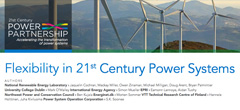 Flexibility of operation—the ability of a power system to respond to change in demand and supply—is a characteristic of all power systems. Flexibility is especially prized in twenty-first century power systems, with higher levels of grid-connected variable renewable energy (primarily, wind and solar). Flexibility in 21st Century Power Systems summarizes the analytic frameworks that have emerged to measure this characteristic and distills key principles of flexibility for policymakers.
Flexibility of operation—the ability of a power system to respond to change in demand and supply—is a characteristic of all power systems. Flexibility is especially prized in twenty-first century power systems, with higher levels of grid-connected variable renewable energy (primarily, wind and solar). Flexibility in 21st Century Power Systems summarizes the analytic frameworks that have emerged to measure this characteristic and distills key principles of flexibility for policymakers.
The following publications were developed under CERI by the Clean Energy Solutions Center, Leonardo Energy and the 21st Century Power Partnership. The reports highlight key clean energy regulatory issues, and they are intended to help educate regulators on clean energy regulation objectives, trends, and best practices.
 Feed-in Tariffs: Good Practices and Design Considerations, part of the Solutions Center’s Clean Energy Policy Briefs series, outlines good practices for enabling effective feed-in tariff (FIT) policies. FITs, along with renewable electricity standards, are one of the most widely adopted renewable energy support policies around the world. In recent years, FIT activity has focused primarily on revisions to current policies, underscoring the need for stable and predictable, yet flexible, policy environments. This policy brief provides a primer on key FIT design elements, lessons from country experience, and support resources to enable more detailed and country-specific FIT policy design.
Feed-in Tariffs: Good Practices and Design Considerations, part of the Solutions Center’s Clean Energy Policy Briefs series, outlines good practices for enabling effective feed-in tariff (FIT) policies. FITs, along with renewable electricity standards, are one of the most widely adopted renewable energy support policies around the world. In recent years, FIT activity has focused primarily on revisions to current policies, underscoring the need for stable and predictable, yet flexible, policy environments. This policy brief provides a primer on key FIT design elements, lessons from country experience, and support resources to enable more detailed and country-specific FIT policy design.
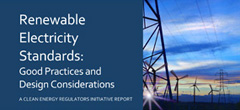 Renewable Electricity Standards: Good Practices and Design Considerations, part of the Solutions Center’s Clean Energy Policy Briefs series, outlines good practices for enabling effective renewable electricity standards (RES). In widespread use globally, RESs are one of the most widely adopted renewable energy policies and a critical regulatory vehicle to accelerate renewable energy deployment. Clear, ambitious and achievable RESs have been critical in driving global renewable energy market growth and investment. This policy brief provides an introduction to key RES design elements, lessons from country experience and support resources to enable more detailed and country-specific RES policy design.
Renewable Electricity Standards: Good Practices and Design Considerations, part of the Solutions Center’s Clean Energy Policy Briefs series, outlines good practices for enabling effective renewable electricity standards (RES). In widespread use globally, RESs are one of the most widely adopted renewable energy policies and a critical regulatory vehicle to accelerate renewable energy deployment. Clear, ambitious and achievable RESs have been critical in driving global renewable energy market growth and investment. This policy brief provides an introduction to key RES design elements, lessons from country experience and support resources to enable more detailed and country-specific RES policy design.
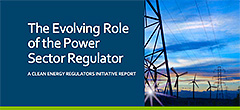 The Evolving Role of the Power Sector Regulator seeks to briefly characterize the evolving role of the power sector regulator. It describes seven existing objectives of power sector regulators and nine emerging objectives, highlighting key challenges and outlining interdependencies. As the preliminary installment in a series, it aims to lay the groundwork for subsequent reports and case studies that will explore these topics in depth.
The Evolving Role of the Power Sector Regulator seeks to briefly characterize the evolving role of the power sector regulator. It describes seven existing objectives of power sector regulators and nine emerging objectives, highlighting key challenges and outlining interdependencies. As the preliminary installment in a series, it aims to lay the groundwork for subsequent reports and case studies that will explore these topics in depth.
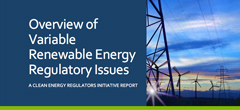 Overview of Variable Renewable Energy Regulatory Issues focuses on key regulatory issues associated with the deployment of variable renewable energy (VRE) sources, especially wind and solar power. Drawing upon research and experiences from various international contexts, the report identifies key issues and ideas that have emerged as VRE deployment has grown and presents a framework for understanding regulatory issues within the larger context of power system evolution. Finally, in order to help regulators anticipate issues that may arise in the future, the report aims to provide a forward look at regulatory lessons learned in cases of high penetrations of VRE.
Overview of Variable Renewable Energy Regulatory Issues focuses on key regulatory issues associated with the deployment of variable renewable energy (VRE) sources, especially wind and solar power. Drawing upon research and experiences from various international contexts, the report identifies key issues and ideas that have emerged as VRE deployment has grown and presents a framework for understanding regulatory issues within the larger context of power system evolution. Finally, in order to help regulators anticipate issues that may arise in the future, the report aims to provide a forward look at regulatory lessons learned in cases of high penetrations of VRE.
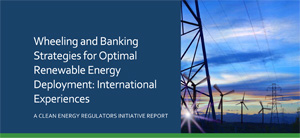 Wheeling and Banking Strategies for Optimal Renewable Energy Deployment: International Experiences defines the principles of wheeling (transmission) tariffs and renewable energy banking provisions and their role in renewable energy deployment in countries with plans for large-scale renewable energy. The paper reviews experiences to date in the United States, Mexico and India and discusses key policy and regulatory considerations for devising more effective wheeling and/or banking provisions for countries with ambitious renewable energy deployment targets.
Wheeling and Banking Strategies for Optimal Renewable Energy Deployment: International Experiences defines the principles of wheeling (transmission) tariffs and renewable energy banking provisions and their role in renewable energy deployment in countries with plans for large-scale renewable energy. The paper reviews experiences to date in the United States, Mexico and India and discusses key policy and regulatory considerations for devising more effective wheeling and/or banking provisions for countries with ambitious renewable energy deployment targets.
